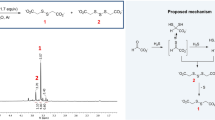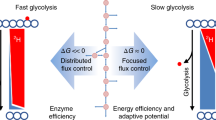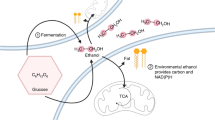Abstract
IT is generally understood that, in the action of carboxylase on pyruvic acid or other allied keto acics, carbon dioxide is directly split off. The following experiments show that this is not so, but that carbonic acid is first formed, the process contrasting with urease action in which carbon dioxide is directly produced in the splitting of urea. (This latter has been investigated by Roughton and Krebs1 with respect to the action of carbonic anhydrase, and the present study of carboxylase is suggested by their procedure.)
This is a preview of subscription content, access via your institution
Access options
Subscribe to this journal
Receive 51 print issues and online access
$199.00 per year
only $3.90 per issue
Buy this article
- Purchase on Springer Link
- Instant access to full article PDF
Prices may be subject to local taxes which are calculated during checkout
Similar content being viewed by others
References
Roughton, F. J. W., Physiol. Rev., 15, 263 (1935).
Author information
Authors and Affiliations
Rights and permissions
About this article
Cite this article
CONWAY, E., MACDONNELL, E. Carboxylase and Carbonic Acid. Nature 156, 752–753 (1945). https://doi.org/10.1038/156752a0
Issue Date:
DOI: https://doi.org/10.1038/156752a0
This article is cited by
-
MECHANISM OF HIGH ACID PRODUCTION BY YEAST AND ITS BEARING ON HYDROCHLORIC ACID FORMATION IN THE STOMACH
Nature (1947)
-
Exchanges of K, Na and H Ions between the cell and the environment
Irish Journal of Medical Science (1947)
Comments
By submitting a comment you agree to abide by our Terms and Community Guidelines. If you find something abusive or that does not comply with our terms or guidelines please flag it as inappropriate.



